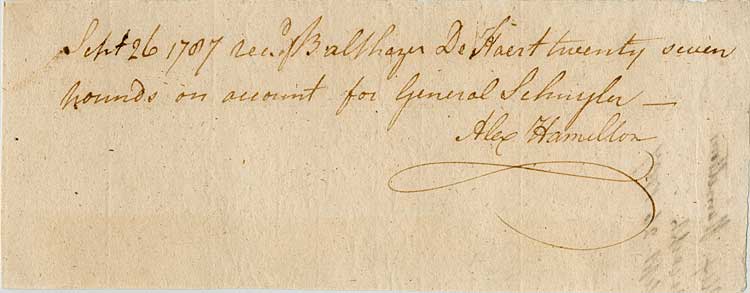SOLD Alexander Hamilton Receives Word That George Washington Wants Him As His Second in Command

“After receiving an official communication of my appointment, I shall without delay repair to Philadelphia. I count always upon your confidence as well in my personal friendship for you as in my zeal for the military service”.
As the first Treasury secretary (1789–95), Hamilton issued three brilliant, controversial reports to Congress, aimed at strengthening the national government. The first, favoring funding of the federal deficit at par and assuming state debts, helped establish national credit; the second proposed a national bank; the third advocated bounties and subsidies to boost...
As the first Treasury secretary (1789–95), Hamilton issued three brilliant, controversial reports to Congress, aimed at strengthening the national government. The first, favoring funding of the federal deficit at par and assuming state debts, helped establish national credit; the second proposed a national bank; the third advocated bounties and subsidies to boost manufacturing. Taken as a whole, Hamilton designed his program to win the public creditors to the government’s support and to help the nation develop economically. His financial and diplomatic policies inspired the formation of the Jeffersonian opposition.
Hamilton had successfully led a regiment in the Revolution, and his vision for national grandeur included establishment of a professional military, despite the traditional fear Americans had of a standing army. During the presidency of John Adams, Hamilton’s prestige remained high and members of the President’s Cabinet often sought and followed his advice. One of these was James McHenry, Adams’ Secretary of War. On July 14, 1798, with war against France looming, George Washington wrote a letter ostensibly to Hamilton indicating for the first time that he wanted Hamilton to be appointed Inspector General, which would make him second in command of the U.S. Army. Since Washington declined active command, organizing and recruiting the new Army would fall to Hamilton. Washington’s letter was, however, sent to McHenry for him to forward to Hamilton, with the understanding that McHenry would make known its contents to the President. Adams opposed the appointment, preferring someone less political (like Henry Knox), but with his Secretary of War and Washington both insisting on Hamilton, felt he had to go along. On July 18, he nominated Hamilton and sent his name to the Senate, which approved the next day. On the 20th, McHenry wrote Hamilton suggesting that they cooperate on military affairs and enclosing Washington’s letter.
Hamilton, not yet officially Inspector General, responded by telling McHenry that as soon as he receives official notice of his appointment, he will hurry to Philadelphia to begin working with him on military matters.
Autograph Letter Signed and marked “Private”, New York, July 22, 1798, to Secretary of War McHenry anticipating his imminent appointment as Inspector General and divulging his plans. “Your letter of the 20th instant, enclosing one from General Washington came to hand this day. The object you suggest in it is one, which no doubt deserves a primary attention; and it will be paid to it. But it will be useful that I should shortly confer with you fully on a variety of subjects, and after receiving an official communication of my appointment, I shall without delay repair to Philadelphia. I count always upon your confidence as well in my personal friendship for you as in my zeal for the military service; and having no inclination to show myself it only remains for me to draw together the plan in which I can best second your operations and promote the service.” Hamilton then explains to McHenry his interesting philosophy of moving forward with speed yet caution. “P.S. In some instances we have missed it in our Brigadiers. It [is] very essential there should be no mistake about the field office. Festina Lente (hurry slowly; hasten calmly) in your choice of officers.” This letter and the letters referred to above are published in the Papers of Alexander Hamilton, volume 22.
Hamilton’s military career abruptly came to an end in 1800 after John Adams, in the face of the opposition of his Cabinet and other Federalist leaders (Hamilton among them), sent a peace mission to France that negotiated a settlement of the major issues. Soon Hamilton would take Thomas Jefferson’s part over that of Aaron Burr, with fatal consequences.

Frame, Display, Preserve
Each frame is custom constructed, using only proper museum archival materials. This includes:The finest frames, tailored to match the document you have chosen. These can period style, antiqued, gilded, wood, etc. Fabric mats, including silk and satin, as well as museum mat board with hand painted bevels. Attachment of the document to the matting to ensure its protection. This "hinging" is done according to archival standards. Protective "glass," or Tru Vue Optium Acrylic glazing, which is shatter resistant, 99% UV protective, and anti-reflective. You benefit from our decades of experience in designing and creating beautiful, compelling, and protective framed historical documents.
Learn more about our Framing Services






































































































